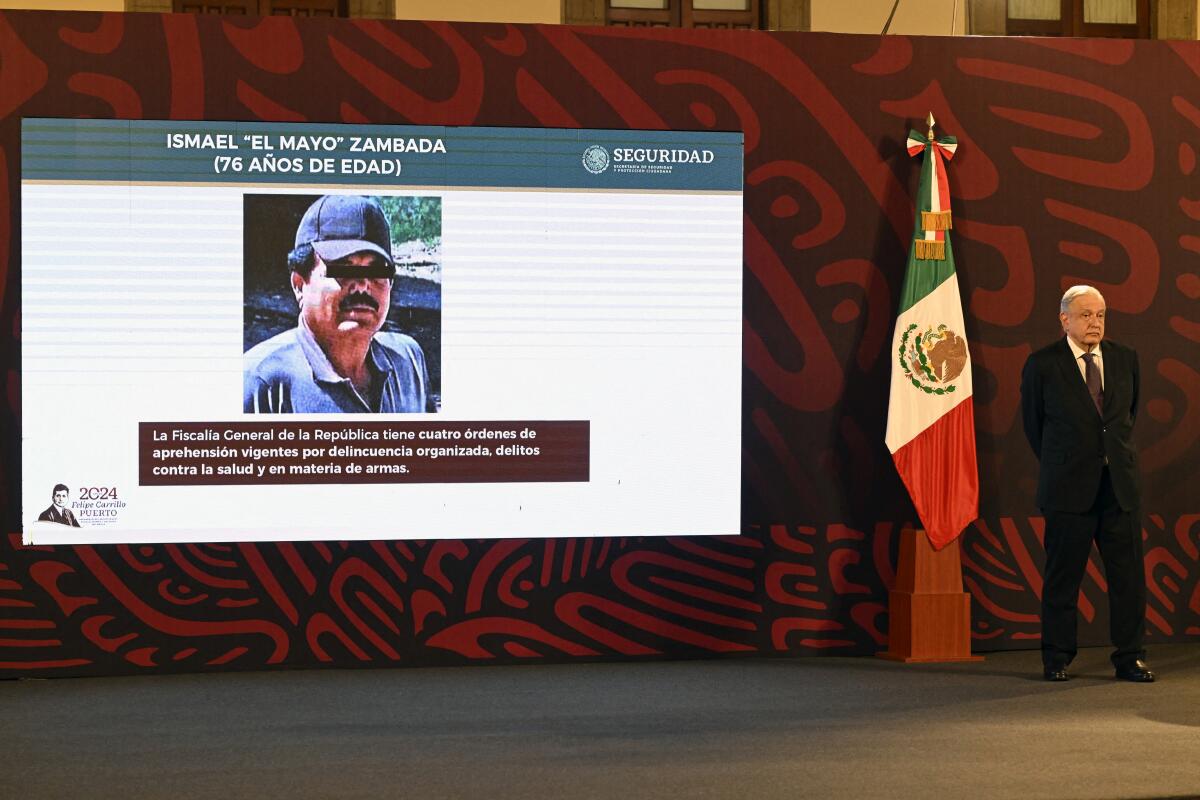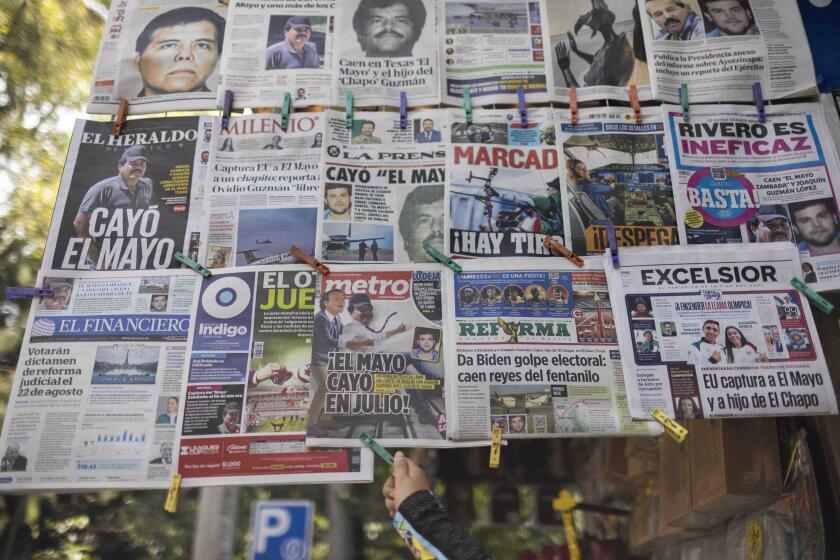Why Mexico was in the dark about the arrest of top Sinaloa cartel leaders

- Share via
MEXICO CITY — Days after the surprise arrest on U.S. soil of two of Mexico’s most wanted fugitives, the details of what exactly transpired remain murky.
Among those questioning how the powerful drug traffickers ended up in handcuffs at a private airport outside El Paso is Mexican President Andrés Manuel López Obrador, who said this week that U.S. authorities have kept his government in the dark about the operation.
“We need more information,” he said. “We need them to tell the truth.”
The president has come under heavy criticism for being blindsided by the capture of Sinaloa cartel leaders Ismael “El Mayo” Zambada García and Joaquín Guzmán López, the son of notorious drug trafficker Joaquín “El Chapo” Guzmán.
Mexican authorities say they weren’t informed about the operation until after the two suspects were detained July 25. They say they still aren’t sure whether an account of the incident proffered by Zambada’s laywer — that the 76-year-old Zambada was kidnapped by Guzmán López and delivered to U.S. authorities — is actually true.
There is growing evidence to suggest Ismael ‘El Mayo’ Zambada was hauled against his will from Mexico to El Paso in an effort by El Chapo’s son to curry favor with U.S. authorities.
That Mexican officials still know so little about a major law enforcement operation executed by a close ally against two of their nationals underscored just how much security cooperation between the two nations has deteriorated under López Obrador, who has furiously defended Mexican sovereignty and has regularly accused U.S. officials of overstepping their authority on Mexican soil.
Trust between the nations has been shaky since 2020, when former Mexican Defense Secretary Salvador Cienfuegos was arrested at Los Angeles International Airport on suspicion of drug trafficking. López Obrador, who said he had not been informed about the investigation, persuaded the Trump administration to return Cienfuegos to Mexico, where he was freed — and later awarded a major military decoration by the president.
The Cienfuegos case — in which López Obrador labeled the U.S. evidence “garbage” — strained U.S.-Mexico relations.
U.S. Drug Enforcement Administration agents grumble that their work in Mexico has been hampered by local authorities. U.S. officials also complain that Mexico isn’t doing enough to counter fentanyl trafficking, and have slammed López Obrador for incorrectly insisting that the synthetic opiod is not produced in Mexico.
López Obrador, meanwhile, accused the U.S. government of “spying” and “abusive meddling” after the DEA announced that it had infiltrated the Sinaloa cartel faction known as Los Chapitos, alleged kingpins who are the sons of the imprisoned El Chapo and specialize in smuggling fentanyl.
She’s ‘El Chapo’ Guzman’s lawyer, using her bond with Mexico’s most notorious cartel kingpin to launch a singing career. Onstage, she’s La Abogada.
Cecilia Farfán-Méndez, a researcher at the Institute on Global Conflict and Cooperation, said “there is very little bilateral work” between the two nations despite a recently renegotiated plan for cooperation on security. News releases touting cross-border law enforcement collaboration, she said, were mostly for show.
“What happens at the operational level has remained very empty,” she said.
For many Mexicans, the rationale behind the U.S. silence in the recent case is humiliating, but understandable: U.S. officials simply don’t trust their Mexican counterparts in a nation where cartels control vast stretches of territory and have long paid off local cops, mayors and high-ranking officials.
“Los gringos were not going to confide in the Mexican government for an operation that was so delicate, historic and sensitive,” columnist Carlos Marín wrote in Mexico’s Milenio newspaper. Mocking the Mexican inquiry into the matter, Marín continued: “What is the Attorney General of the Republic going to do ... ask for the extradition of the U.S. agents who planned and executed this very singular feat?”
A long lineage of cases against crooked Mexican law enforcement authorities attests to the rationale behind Washington’s lack of confidence.
In the most sensational recent instance, Genaro García Luna, Mexico’s former security chief and the former face of the anti-drug war, was convicted in U.S. District Court in Brooklyn last year of taking millions of dollars in bribes from the Sinaloa cartel.
Soldiers and civilians have been killed in separate incidents in recent months involving ‘narco mines’ planted in western Mexico.
Derek Maltz, former director of the DEA’s special operations division, said he was not privy to information about the arrests of Zambada and Guzmán López, but he wasn’t surprised to hear Mexican officials say they had been kept out of the loop.
“It’s a very sensitive situation,” Maltz said. “We know the Mexican government is super corrupt and we know high-level ops have been compromised for years.”
Maltz noted how for years Zambada’s former partner, “El Chapo” Guzmán, slipped through the hands of law enforcement after U.S. officials shared detailed information about his location with their Mexican counterparts.
“We’d call him Houdini,” Maltz said. “He would escape every effort at the last minute. Obviously they were on the payroll. Things haven’t changed. Mexican officials are on the payroll and constantly monitoring U.S. law enforcement efforts to go after the kingpins.”
Maltz said even with the near-misses and suspected leaks, there was little U.S. agents could do because they are operating in a foreign country. Guzmán was eventually captured by Mexican special forces in 2016, extradited and sentenced to life in a U.S. prison.
What exactly happened July 25 remains murky and swirling with intrigue.
What is clear is that Zambada and Guzmán López were aboard a plane that took off from somewhere in Mexico and landed Thursday in a small airport in rural New Mexico, just across the Texas state line from El Paso. U.S. officials at first said Zambada had been tricked to get onto the plane. But Zambada’s laywer later asserted that Guzmán López had forced Zambada on board and tied him up, essentially kidnapping him.
Speculation has spread in Mexico that Guzmán López sought to turn in the elderly, rival capo in hopes of leniency for himself and his younger brother, Ovidio, who is also in federal custody in the United States facing drug-smuggling charges. But Guzmán López’s lawyer told reporters in Chicago on Tuesday that his client has no deal in place with federal prosecutors.
“You ask if it was a delivery, if it was capture,” Rosa Icela Rodríguez, Mexico’s security secretary, told reporters. “That is part of the investigation and part of the information that we would be expecting from the government of the United States.”
Linthicum and McDonnell reported from Mexico City, Hamilton from San Francisco. Times staff writer Cecilia Sánchez Vidal in Mexico City contributed to this report.
More to Read
Sign up for Essential California
The most important California stories and recommendations in your inbox every morning.
You may occasionally receive promotional content from the Los Angeles Times.















